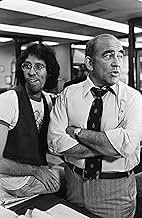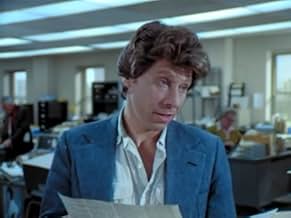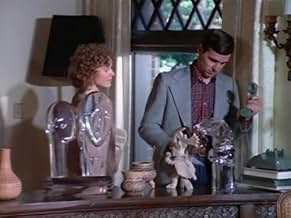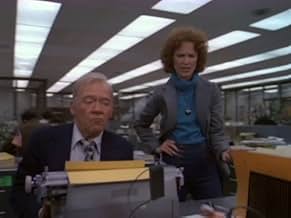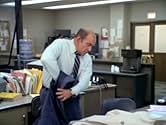VALUTAZIONE IMDb
7,3/10
2586
LA TUA VALUTAZIONE
I processi a un ex direttore di un'emittente televisiva, diventato direttore di un quotidiano cittadino, e al suo staff giornalistico.I processi a un ex direttore di un'emittente televisiva, diventato direttore di un quotidiano cittadino, e al suo staff giornalistico.I processi a un ex direttore di un'emittente televisiva, diventato direttore di un quotidiano cittadino, e al suo staff giornalistico.
- Vincitore di 13 Primetime Emmy
- 28 vittorie e 73 candidature totali
Sfoglia gli episodi
Recensioni in evidenza
Judged by 1977-82 standards, this show was peerless.
Today, it's a bit "dated" in certain ways. But these elements actually make it a valuable portrait of its era.
Talented cast, right down the line. Terrific writing. Skillful, sensitive directing. Highly relevant. Courageous. And one of TV's all-time-best role models in the lead.
Every Emmy -- & there were MANY -- was fully deserved. Also the Peabody, the Humanitas, & all the other awards it won.
Each season was as strong as or stronger than its predecessor; this is one show that was NOT running out of steam.
In fact, during the Reagan Years, we needed it more than ever! (Would have loved to see its take on Iran-Contra.)
Shame on CBS for bowing to pressure because of Asner's politics and the show's oft-controversial scripts.
LOU still shines.
Waiting impatiently for (legal) DVD release!
Today, it's a bit "dated" in certain ways. But these elements actually make it a valuable portrait of its era.
Talented cast, right down the line. Terrific writing. Skillful, sensitive directing. Highly relevant. Courageous. And one of TV's all-time-best role models in the lead.
Every Emmy -- & there were MANY -- was fully deserved. Also the Peabody, the Humanitas, & all the other awards it won.
Each season was as strong as or stronger than its predecessor; this is one show that was NOT running out of steam.
In fact, during the Reagan Years, we needed it more than ever! (Would have loved to see its take on Iran-Contra.)
Shame on CBS for bowing to pressure because of Asner's politics and the show's oft-controversial scripts.
LOU still shines.
Waiting impatiently for (legal) DVD release!
In the final episode of "The Mary Tyler Moore Show"(CBS-TV:1970-1977),when everyone but idiotic anchorman Ted Baxter was fired from station WJM-TV in Minneapolis in 1977,Mary Richards and her fellow casualties were left reeling. It was a bittersweet finale for the beloved series after seven seasons. Then Mary's old crusty boss,station news director Lou Grant,made a smooth transition. Within weeks,he had blown Minneapolis and snagged a good job in Los Angeles as the city editor of The Tribune. That's right:Lou Grant went from the glamour and glitz of TV news(such as it was at bumbling WJM) to embrace print journalism. At The Tribune,the formerly comic Lou(still played by Edward Asner)got serious about news. What resulted was "Lou Grant," a superlative drama series that became one of the greatest dramatic shows ever to embrace the mid-1970's. This was a grand series that arrived in the blazing afterglow of Watergate coverage and the rehealing from the aftermath of the Vietnam War. The bracing message of that era: Two dogged reporters(and a newspaper that backed them up)could change the world-and earn the public's adoration.
Anti-press fulminations from the Nixon administration were largely nullified by scandals and disgrace in the White House. It was only later that an anti-media crusade took hold,drawing the battle lines between the press and the government,and breeding suspicion among much of the citizenry. It was later,as well,that newspapers were obliged to adapt to emerging,unimagined challenges:new media platforms,"citizen journalists",and information-dispersing gadgets with global reach that anyone could buy. The Trib reporters were spared these distractions and identity crises. For them,news still took the form of ink on paper,preferably with comics,crosswords puzzles,and horoscopes were part of the deal. The zeitgeist of "Lou Grant" was set forth in the clever opening sequence and this show celebrated it. Sure it may seem primitive that,in its first season,Trib reports were getting information and their sources with pencil and paper and banging out their stories on the typewriters. But "Lou Grant" was breaking ground from its debut on September 20,1977 producing 114 episodes for CBS-TV until the series finale on September 13,1982. Produced under Mary Tyler Moore's production company,MTM Productions.
Reconfiguring a half-hour sitcom into a hour long drama was risky. The show dared to populate "Lou Grant" with a full-out ensemble cast which not only included Ed Asner,but also Robert Walden who played driven young investigate reporter Joe Rossi;Mason Adams as Managing Editor Charlie Hume;Linda Kelsey as reporter Billie Newman determined to make good in what was at the time a male-domination profession along with another ambitious young girl reporter Carla Mardigian portrayed by Rebecca Balding(who lasted one season). Also on board was the glorious Nancy Marchand(later,of course Tony's craven mother on "The Sopranos")was Mrs. Pynchon,who was the genteel owner of the Trib. Taking full advantage of its news-oriented setting,this was a brilliant series that dealt with issues ranging from nuclear accidents to religious freedom,media ethics and civil and social rights. This was a big-hearted series that won 13 Emmys,two Humanita Prizes and a Peabody award among many honors. This was drama-comedy hybrid that emerged from the series creators:James L. Brooks and Allan Burns(the writers-producers from "Mary Tyler Moore"),along with Gene Reynolds(who was not only the principal behind the TV incarnation of "M*A*S*H",but also was the producer of such shows as "Room 222"). This was a series that broke ground in the way television dramas are depicted and to this day it still holds the title some 30 years later.
Anti-press fulminations from the Nixon administration were largely nullified by scandals and disgrace in the White House. It was only later that an anti-media crusade took hold,drawing the battle lines between the press and the government,and breeding suspicion among much of the citizenry. It was later,as well,that newspapers were obliged to adapt to emerging,unimagined challenges:new media platforms,"citizen journalists",and information-dispersing gadgets with global reach that anyone could buy. The Trib reporters were spared these distractions and identity crises. For them,news still took the form of ink on paper,preferably with comics,crosswords puzzles,and horoscopes were part of the deal. The zeitgeist of "Lou Grant" was set forth in the clever opening sequence and this show celebrated it. Sure it may seem primitive that,in its first season,Trib reports were getting information and their sources with pencil and paper and banging out their stories on the typewriters. But "Lou Grant" was breaking ground from its debut on September 20,1977 producing 114 episodes for CBS-TV until the series finale on September 13,1982. Produced under Mary Tyler Moore's production company,MTM Productions.
Reconfiguring a half-hour sitcom into a hour long drama was risky. The show dared to populate "Lou Grant" with a full-out ensemble cast which not only included Ed Asner,but also Robert Walden who played driven young investigate reporter Joe Rossi;Mason Adams as Managing Editor Charlie Hume;Linda Kelsey as reporter Billie Newman determined to make good in what was at the time a male-domination profession along with another ambitious young girl reporter Carla Mardigian portrayed by Rebecca Balding(who lasted one season). Also on board was the glorious Nancy Marchand(later,of course Tony's craven mother on "The Sopranos")was Mrs. Pynchon,who was the genteel owner of the Trib. Taking full advantage of its news-oriented setting,this was a brilliant series that dealt with issues ranging from nuclear accidents to religious freedom,media ethics and civil and social rights. This was a big-hearted series that won 13 Emmys,two Humanita Prizes and a Peabody award among many honors. This was drama-comedy hybrid that emerged from the series creators:James L. Brooks and Allan Burns(the writers-producers from "Mary Tyler Moore"),along with Gene Reynolds(who was not only the principal behind the TV incarnation of "M*A*S*H",but also was the producer of such shows as "Room 222"). This was a series that broke ground in the way television dramas are depicted and to this day it still holds the title some 30 years later.
Immigration reform, hate crimes against gay people, teen pregnancy, illiteracy, eminent domain, Ponzi schemes, etc. If I stop here and ask you to finish this, you might conclude with a summary about Bernie Madoff or other recent event.
But these are just some of the many subjects shown weekly on Lou Grant from 1977 to 1982. The stories are over 30 years old but amazingly still every bit as relevant in today's society as they were then. And just as amazing was the incredible risk Mary Tyler Moore's MTM Enterprises took when she transitioned to producing a hard-hitting drama from 2 decades of comedy experience. After winning 3 Golden globes, 23 other awards, and 61 various nominations (IMDB 2012), the show has proved worth the risk in a big way.
I didn't have the education or knowledge of world events (such as it is) to appreciate the show's content when it first aired. But I'm glad I rediscovered and watched these episodes while in a nostalgic mood. Now, I can greatly appreciate how progressive MTM and her staff were in the production of Lou Grant and its relevance to today's events.
But these are just some of the many subjects shown weekly on Lou Grant from 1977 to 1982. The stories are over 30 years old but amazingly still every bit as relevant in today's society as they were then. And just as amazing was the incredible risk Mary Tyler Moore's MTM Enterprises took when she transitioned to producing a hard-hitting drama from 2 decades of comedy experience. After winning 3 Golden globes, 23 other awards, and 61 various nominations (IMDB 2012), the show has proved worth the risk in a big way.
I didn't have the education or knowledge of world events (such as it is) to appreciate the show's content when it first aired. But I'm glad I rediscovered and watched these episodes while in a nostalgic mood. Now, I can greatly appreciate how progressive MTM and her staff were in the production of Lou Grant and its relevance to today's events.
Another great MTM studio production from the 70's taking the major risk of re-setting a familiar comedic character - the boozy, boorish TV editor Lou Grant as the central character in a 50 minute topical drama set in a major city news-room.
Like its MTM comedy predecessors, likewise invariably named after one character "Lou Grant" of course isn't just about Lou, it's more about the interplay with an ensemble of strong, supporting characters. Better yet, the plot-lines were literate and credible slices of real life, often centring on corruption in high places, with the leg-work being done by the two bright young reporters Joe Rossi, played by Robert Walden and Billie, played by Linda Kelsey. Also in support are beatnik photographer Animal, presumably named after one of the Muppets, the style-conscious sub-editor Art Donovan and at the top end of the paper, its matriarch publisher Mrs Pynchon and her right hand man, Charlie Hulme. Edward Asner in the title role did a fine job re-inventing himself as the pugnacious but principled title character. The whole programme could have failed if his character had failed its transition but this was never in doubt right from the first episode I've recently re-watched.
The plots invariably involved some sort of moral dilemma for one of the characters, not unnaturally given the post-Watergate interest in newspapers and their role in exposing dirty deeds done in high places. Critics might argue against the show's occasional bleeding-heart liberalism, but I remember it just as high quality US drama and staying up till well after 11 o'clock to watch it in the days before video recorders.
In its wake came other MTM hit series like "Hill Street Blues" and "St Elsewhere" but I think I enjoyed this series even better than those. Bad fashion sense aside and even conceding the much lesser role that newspapers play in news dissemination today, I don't think this show has aged much at all, a testimony to good writing and good acting all round.
Like its MTM comedy predecessors, likewise invariably named after one character "Lou Grant" of course isn't just about Lou, it's more about the interplay with an ensemble of strong, supporting characters. Better yet, the plot-lines were literate and credible slices of real life, often centring on corruption in high places, with the leg-work being done by the two bright young reporters Joe Rossi, played by Robert Walden and Billie, played by Linda Kelsey. Also in support are beatnik photographer Animal, presumably named after one of the Muppets, the style-conscious sub-editor Art Donovan and at the top end of the paper, its matriarch publisher Mrs Pynchon and her right hand man, Charlie Hulme. Edward Asner in the title role did a fine job re-inventing himself as the pugnacious but principled title character. The whole programme could have failed if his character had failed its transition but this was never in doubt right from the first episode I've recently re-watched.
The plots invariably involved some sort of moral dilemma for one of the characters, not unnaturally given the post-Watergate interest in newspapers and their role in exposing dirty deeds done in high places. Critics might argue against the show's occasional bleeding-heart liberalism, but I remember it just as high quality US drama and staying up till well after 11 o'clock to watch it in the days before video recorders.
In its wake came other MTM hit series like "Hill Street Blues" and "St Elsewhere" but I think I enjoyed this series even better than those. Bad fashion sense aside and even conceding the much lesser role that newspapers play in news dissemination today, I don't think this show has aged much at all, a testimony to good writing and good acting all round.
When I first heard about this show twenty six years ago (God, time flies), I thought this would be an extension of the show it spun off from, "The Mary Tyler Moore Show". What a surprise it was when this show turned out to be probably the greatest newspaper dramas in television history. The show wasn't afraid to take on controversial issues and even though it was a drama, it still had its lighter moments. Also, even though Ed Asner was the lead, it was more of an ensemble and the whole cast was great. This was an exceptional show and it is a lost classic.
Lo sapevi?
- QuizMrs. Pynchon, the widowed owner of the fictional Los Angeles Tribune, was based on Katherine Graham, the real widowed owner of the Washington Post, and on Dorothy "Dolly" Schiff, owner and publisher of the New York Post. Schiff, for example, always carried her small dog with her, like Mrs. Pynchon.
- Citazioni
Billie Newman: I hate it when people tell me to calm down!
- ConnessioniFeatured in The 30th Annual Primetime Emmy Awards (1978)
I più visti
Accedi per valutare e creare un elenco di titoli salvati per ottenere consigli personalizzati
- How many seasons does Lou Grant have?Powered by Alexa
Dettagli
- Data di uscita
- Paese di origine
- Lingua
- Celebre anche come
- Gazeteciler
- Luoghi delle riprese
- The Title Guarantee & Trust Building, 411 West 5th Street, Los Angeles, California, Stati Uniti(Los Angeles Tribune Building)
- Azienda produttrice
- Vedi altri crediti dell’azienda su IMDbPro
Contribuisci a questa pagina
Suggerisci una modifica o aggiungi i contenuti mancanti



